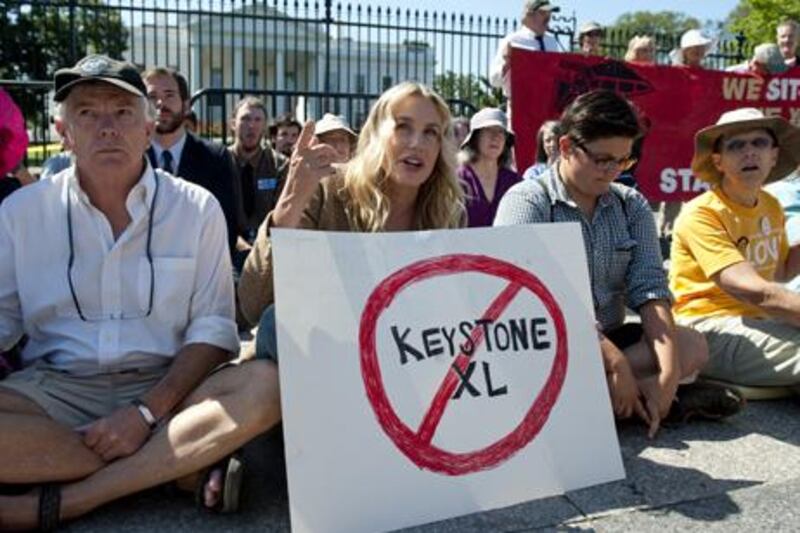If you want to build an oil pipeline that stretches 2,700km from Canada's oil sands to Texan refineries, you're going to have to answer to Hollywood.
In Robert Redford's latest screen appearances, the Oscar-winning legend isn't taming horses or romancing Meryl Streep. He's on YouTube, speaking out against the controversial Keystone XL pipeline. Redford calls on President Barack Obama to protect "America's heartland" from environmental disaster by blocking the pipeline. And he just might get the last word.
Ever since Hollywood stars turned up the heat on the pipeline project, its future has become increasingly uncertain. On November 10, the government announced the initiative would be shelved until at least 2013. Redford issued a new video - this time, extending a heartfelt thank you to the president for listening to the voices of the people.
The announced delay represents a dramatic political turnaround from just a few weeks ago. Obama was expected to give Keystone the nod in December, allowing construction to begin in the new year. The pipeline would cross over an ecologically sensitive area in Nebraska, but that was seen as a small price to pay for creating jobs and meeting America's energy demands.
Of course, environmental groups had been opposed to the pipeline since its infancy, arguing it would only increase the country's dependence on oil and that leaks and spills would be inevitable. But when high-profile Hollywood celebrities joined the chorus in the summer, the issue shot to the top of the media, and the public, radars. The battle against Keystone turned a corner.
In August, the actress Daryl Hannah was among several hundred people arrested during a sit-in protest outside the White House. Even as the handcuffs were put on her, she shouted: "No to the Keystone pipeline!" Over the course of the autumn, the actor Mark Ruffalo emerged as an anti-pipeline spokesman in the news, and the actress Julia Louis-Dreyfus turned up at the White House to join the crowd who were forming a human chain around the building.
The veteran protesters welcomed Hollywood with open arms. Greenpeace Canada's Mike Hudema says celebrities reach a mainstream audience that environmental groups don't always access. He maintains this is a people's victory - but he is thankful for Redford's YouTube videos and Ruffalo's media interviews.
"I think it helped. I think in any campaign, the more voices you have calling out, the more diversity in who those voices are and what audiences those voices reach, the more effective your campaign is going to be."
The Hollywood stars weren't the only familiar faces who joined in the chorus against Keystone. Nobel Laureates including Archbishop Desmond Tutu and the Dalai Lama wrote letters to Obama and the Canadian prime minister Stephen Harper calling on them to rethink the pipeline.
None of this went over well with Canada's energy minister, Joe Oliver, the man tasked with selling Americans on the pipeline. In his addresses to business and political audiences, Oliver took to singling out "celebrity protesters" and dismissing them as not having the facts. He was evidently concerned they were being heard.
An A-list celebrity is a valuable asset to any cause, says Sol Hart, a communications professor at the American University in Washington. Celebrities grab the attention of the media and the public. If they're active on Twitter, that further increases their influence among their fellow citizens.
But this doesn't mean political activism is all fun and games for the stars. Hart adds that celebrity political engagement can affect a star's marketability - sometimes for better, but sometimes for worse. While Angelina Jolie's advocacy work demanded Americans pay attention to the floods in Pakistan last year, The Dixie Chicks' lead singer Natalie Maines is still ostracised in parts of the US after speaking out against the George W Bush administration ahead of the Iraq war.
The decision to put the pipeline on hold is widely viewed as a political manoeuvre to save Obama from deciding one way or the other before the 2012 presidential election. Many of Obama's base supporters are opposed to the pipeline, and he doesn't want to lose their votes. Hollywood stars bring the additional promise of not only being left-leaning, but wealthy and motivated - valuable assets as the Democrats launch a tough re-election campaign.
The proponents of Keystone XL hope that the pipeline construction will proceed, after it is re-routed around the Sand Hills ecoregion of Nebraska and wins political backing. The day the delay was announced, Canada's energy minister stayed positive.
"While we are disappointed with the delay, we remain hopeful the project will be decided on its merits and eventually approved," Oliver said in a statement.
Not if Redford has anything to say about it.





